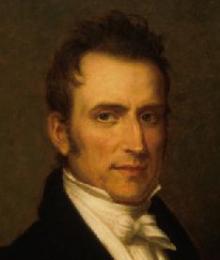- Home
- Archival Material
- College History Projects
- Subject-Based Digital Projects
John McLean (1785-1861)

John McLean was born in Morris County, New Jersey on March 11, 1785 as the eldest son and first child of Scots-Irish immigrants Fergus and Sophia Blockford McLean. By the time the young McLean was fourteen, his family had moved to Virginia, Kentucky, and finally to Lebanon, Ohio where the family finally settled to farm. He attended a neighborhood school and took on extra work clearing other farmers' land to pay for private tutors to buttress what had been a poor early education. At eighteen he left for Cincinnati and a two year indentured apprenticeship with John Stites Grano, Clerk of the Court of Hamilton County. He also studied law there with Arthur St. Clair. In 1807 he was called to the Ohio bar.
He returned to Lebanon and began a weekly newspaper, the Western Star, and opened a law practice. He gained political friends and was appointed as an examiner in the United States Land Office in Cincinnati in 1811. The following year he was elected to the 13th United States Congress, serving as a western War Hawk strongly supporting war with Great Britain. He was re-elected in 1814 and chaired the committee on accounts. He turned down the opportunity to serve in the U.S. Senate from Ohio in 1815 and instead took a seat on the Ohio Supreme Court in 1816. He had supported James Monroe's bid for the Presidency that year as well and this was remembered, earning McLean a seat in Monroe's cabinet as postmaster general. His work in putting that department on a more efficient footing, together with its massive expansion into the western territories, earned him continuation in his post under the following administration of John Quincy Adams. He served as postmaster general from 1823 to 1829 and during his work had come to abhor the appointment and removal of officials on political grounds. This philosophy had much to do with him turning down appointments, including Secretary of War, in the Jackson Administration. The new president, instead, appointed him to the United States Supreme Court and the Senate confirmed him in March 1829.
Two themes mark his thirty-year tenure on the Court. He was vehemently anti-slavery and held that, legally, slavery originated in the use of force and not right. This led him to his famous dissent in the Dred Scott case. Second, he was generally seen as "the politician on the Supreme Court" since he never set aside his own presidential ambitions, considering runs under several party banners. His views on slavery, though, vaulted him into serious contention as the nominee of the fledgling Republican Party in 1856 but was outmaneuvered by those supporting John C. Fremont.
A practicing Methodist, John McLean joined in 1833 the new board of trustees charged with overseeing the re-opening under Methodist Episcopal auspices of the previously Presbyterian-affiliated Dickinson College in Carlisle, Pennsylvania. He served a a member of the board for twenty years, until 1855.
McLean had married Rebecca Edwards in 1807 during his first stay in Cincinnati. The couple had four daughters and three sons. Rebecca died in 1840 and McLean married a widow named Sarah Bella Gerrard in 1843. John McLean died in Cincinnati on April 4, 1861, eight days before the bombardment of Fort Sumter, and was buried in the Spring Grove Cemetery in that city. He was seventy-six years old.
Date of Post:
2005
College Relationship:
Trustee - Years of Service:
1833-1855